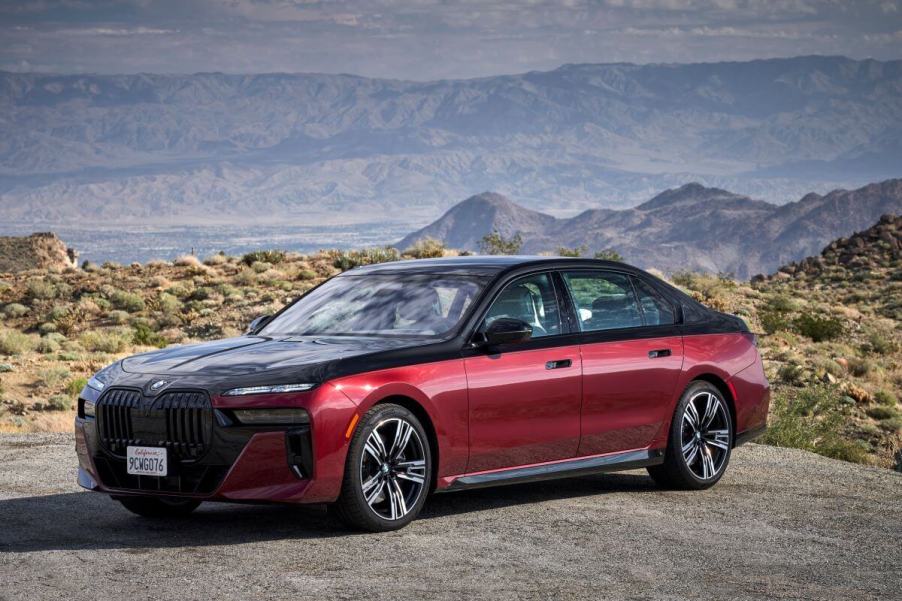
Gas or Electric BMW 7 Series: Which Is the Better Bet?
Electric vehicles have found enough of an audience that they’re now considered mainstream, with electric charging just another form of fueling. Car manufacturers have expanded their lines of hybrids and fully electric vehicles, including producing nearly identical models that differ in fuel or power choice. This includes BMW‘s gas-powered 7 series and its all-electric i7 version.
Increasing gas prices and a wish to move away from fossil fuels often convince car buyers that they should buy an electric vehicle if given the choice. Yet those wishes may pale in comparison to the disadvantages that electric vehicles can have for some drivers. Which one is right depends on the buyer’s needs and circumstances, rather than the desire to use a particular power source for environmental purposes.
The BMW 7 Series (gas version)
The redesigned 2023 BMW 7 series gets a good review from Edmunds, whose driver was impressed with its acceleration. There was one puzzling issue with initial pedal-to-the-metal acceleration in the form of a half-second delay before the engine took off.
But other than that, the power was impressive, and the ABS stopped the car easily— a real advantage considering that the 7 is a fairly large sedan—although the driver noticed that they were pitched forward right when the car stopped completely.
Handling was generally good, although the softer seats led to some physical instability for the driver, who wrote that they had to brace their leg to stabilize themselves when using the car’s Comfort mode for steering.
According to Edmunds, the BMW 7 series should cost between $249 and $319 in fuel every month (using California gas prices as a model), depending on the trim. That price will vary depending on your location and driving habits. The MSRP ranges from about $93,000 to just under $114,000.
The BMW i7 Series (electric version)
The new 2023 BMW i7 series, the battery-electric version of the 7, gets a glowing review from Edmunds. The driver preferred the i7 to the 7, admiring the very quiet ride, the much smoother acceleration and braking, the impressive speed, and the efficient handling.
Visually the two models are very similar. However, the performance of the i7 was preferable in just about every way. Notably, the backseat contains a massage function. The only real negatives were the feeling that the rear window and trunk were a bit smaller than is preferable, the controls weren’t completely intuitive, a lack of interior storage, and installing child seats could be difficult.
Depending on the wheels you have on the car, along with driving habits, the i7 is supposed to get between 308 and 318 miles per charge when new. Edmunds estimates that after eight years, the range will be down to 272 miles. The estimated charging cost per month is $152.
Who should get which model?
The combination of better review plus no gas usage may look terrific, and it is terrific for a lot of buyers. Other buyers may find the BMW 7 series that uses gas could be the better bet. It really comes down to the driver’s needs versus the driver’s circumstances.
An easy comparison is the price. If spending over $100,000 on a car isn’t a possibility, that leaves one trim package for the 7 series, priced around $93,000. Another is charging capability. If you live in an apartment complex that doesn’t have charging stations, you have no in-apartment charging unit, and the charging stations near you are almost always broken, the 7 series is better for your current situation.
Some states are making it easier for renters to access or install charging stations. But as NPR found, the lack of charging stations can be a deterrent nonetheless.
However, if you have a long commute, and gas prices in your area are high, the lower charging cost of the i7 series is a definite plus as long as you can find a charging station. And with states adding more of those, finding an open station should become much easier, even if you’re traveling.
Specific to the models themselves, other than fuel or power source, are the issues the drivers had when testing the models. If the feel of the car on the road is a major concern because you don’t like slight delays in acceleration or feeling anything related to momentum when you’re braking, the i7 series is clearly a better choice.
If you need to install a car seat, test that out first before buying either car to see which one makes the process easier for you. Remember, one of the Edmunds drivers noted the difficulty they had installing a car seat in the i7 series.
Whether you prefer the purr of the BMW i7 series, the fueling ease of the BMW 7 series, or the features of another BMW model, the manufacturer continues to impress. You really can’t go wrong with its models once you decide which fuel or power source fits in better with your lifestyle.



